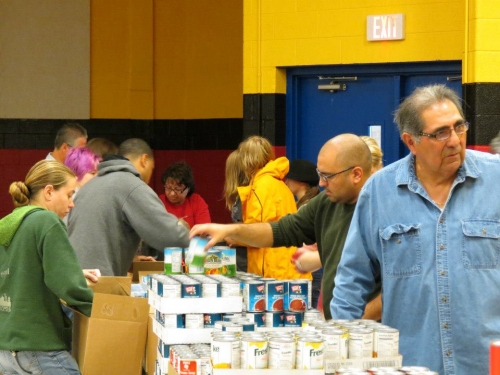“Weekend Survival Kits” supplement the diets of children in food-insecure households
The collaborative efforts of Michigan State University extension and a variety of community organization and businesses have organized to combat food insecurity in Ingham County.
 According to the United States Department of Agriculture, 22% of U.S. children – more than 1 in 5 – lived in a household that was food insecure at some point during 2011.
According to the United States Department of Agriculture, 22% of U.S. children – more than 1 in 5 – lived in a household that was food insecure at some point during 2011.
Dissatisfied with these trends in Ingham County, Mich., a consortium of businesses, service clubs, churches, community organizations, non-profits and educators from Michigan State University Extension have organized to fight childhood food insecurity by providing supplemental food with the Weekend Survival Kit program.
Food-insecurity is a term used by the United States Department of Agriculture (USDA) to refer to “the limited or uncertain availability of nutritionally adequate and safe foods or limited or uncertain ability to acquire acceptable foods in socially acceptable ways.” “Very low food security,” the most severe level measured by the survey, is characterized by irregular meals and inadequate food intake, as determined by caregivers.
As reported by Child Trends Data Bank, “Children in food-insecure households have more stomach aches, frequent headaches, and colds than children who are in food-secure households. Higher rates of hospitalization, iron deficiency anemia, and chronic health conditions are reported among food-insecure children.” Additionally, “Food-insecure children show smaller gains in math and reading achievement between kindergarten and third grade, and, among those ages 6 to 11, a higher likelihood of repeating a grade.”
Weekend Survival Kits contain “child-friendly” foods that are easy and quick for a responsible child to prepare. Typical non-perishable food items in the kits are canned fruit and vegetables, soup, pudding, boxed macaroni and cheese, crackers, juice boxes and snack bars. The kits are intended to provide supplemental meals during times when students aren’t being served a school meal or when the household food supply is low, such as weekends.
Food for the kits is purchased at significantly discounted prices from the Greater Lansing Food Bank. Volunteers pack kits in various venues across the county, from church basements to school cafeterias. Transporting hundreds of kits to multiple elementary schools - urban, suburban and rural is challenging. Allegra Marketing Print Mail of Okemos utilizes excess delivery truck capacity to deliver kits to six or more schools twice per month.The Food and Nutrition Services Department of the Lansing School District drops off kits to several Lansing elementary schools in the course of delivering daily school meals.
The Ingham County program relies on donated funds which are used exclusively to purchase food and supplies such as plastic storage bags. To facilitate fundraising activities, a charitable organization named Many Hands was formed with the specific mission of supporting Weekend Survival Kit programs in Ingham County. Many Hands held a successful 5K race in September 2012 and will be conducting additional events throughout the year.
Do Weekend Survival Kits make a difference? In a survey conducted in 2011, here’s what one parent had to say about the program, “We eat everything from the kits, my kids especially like the juice boxes and the snacks. I have more money to use for meat, eggs and milk.”
Teachers report benefits also. One teacher reported, “I think the program is wonderful! It gives me more peace of mind that the children in my classroom have food at home.”
For more information about Weekend Survival Kits and other community-based programming efforts to reduce food insecurity, contact Randy A. Bell, MSU Extension educator for Community Food Systems by email at: bellr@anr.msu.edu or by phone at 517.604.0180.



 Print
Print Email
Email

